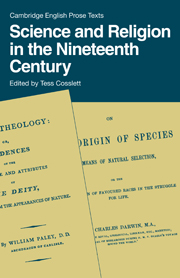Book contents
- Frontmatter
- Contents
- Editorial note
- Introductory essay
- 1 WILLIAM PALEY, Natural Theology (1802), Chapters 1–3
- 2 ROBERT CHAMBERS, Vestiges of the Natural History of Creation (1844), Chapter 14, ‘Hypothesis of the Development of the Vegetable and Animal Kingdoms’
- 3 HUGH MILLER, The Testimony of the Rocks (1857), Lecture Fifth, ‘Geology in its Bearings on the Two Theologies’, Part I
- 4 CHARLES DARWIN, On the Origin of Species (1859), Chapter 14, ‘Recapitulation and Conclusion’
- 5 CHARLES GOODWIN, ‘On the Mosaic Cosmogony’, Essays and Reviews (1860)
- 6 LEONARD HUXLEY, Life and Letters of Thomas Henry Huxley (1903), vol. 1, Chapter 14, ‘1859-1860’
- 7 CHARLES DARWIN, The Descent of Man (1871), Chapter 21, ‘General Summary and Conclusion’
- 8 JOHN TYNDALL, ‘The Belfast Address’, Nature, 20 August 1874
- 9 FREDERICK TEMPLE, The Relations between Religion and Science (1884), Lecture VI, ‘Apparent Collision between Religion and the Doctrine of Evolution’; and Lecture VIII, ‘The Conclusion of the Argument’
- Notes
- Select booklist
5 - CHARLES GOODWIN, ‘On the Mosaic Cosmogony’, Essays and Reviews (1860)
Published online by Cambridge University Press: 18 January 2010
- Frontmatter
- Contents
- Editorial note
- Introductory essay
- 1 WILLIAM PALEY, Natural Theology (1802), Chapters 1–3
- 2 ROBERT CHAMBERS, Vestiges of the Natural History of Creation (1844), Chapter 14, ‘Hypothesis of the Development of the Vegetable and Animal Kingdoms’
- 3 HUGH MILLER, The Testimony of the Rocks (1857), Lecture Fifth, ‘Geology in its Bearings on the Two Theologies’, Part I
- 4 CHARLES DARWIN, On the Origin of Species (1859), Chapter 14, ‘Recapitulation and Conclusion’
- 5 CHARLES GOODWIN, ‘On the Mosaic Cosmogony’, Essays and Reviews (1860)
- 6 LEONARD HUXLEY, Life and Letters of Thomas Henry Huxley (1903), vol. 1, Chapter 14, ‘1859-1860’
- 7 CHARLES DARWIN, The Descent of Man (1871), Chapter 21, ‘General Summary and Conclusion’
- 8 JOHN TYNDALL, ‘The Belfast Address’, Nature, 20 August 1874
- 9 FREDERICK TEMPLE, The Relations between Religion and Science (1884), Lecture VI, ‘Apparent Collision between Religion and the Doctrine of Evolution’; and Lecture VIII, ‘The Conclusion of the Argument’
- Notes
- Select booklist
Summary
Essays and Reviews was an immediate sensation when it came out in 1860. It was a collection of essays by seven ‘liberal’ Anglicans, six of them clergymen, who were vilified by their opponents as ‘Septem Contra Christum’ (Seven Against Christ). Essays and Reviews was associated in the public mind with Darwin's Origin of Species which had come out the year before: this is how Samuel Butler sees it in The Way of All Flesh (1903):
It must be remembered that the year 1858 was the last of a term during which the peace of the Church of England was singularly unbroken … I need hardly say that the calm was only on the surface … the wave of scepticism which had broken over Germany was setting towards our own shores, nor was it long, indeed, before it reached them … three works in succession arrested the attention even of those who paid least heed to theological controversy. I mean Essays and Reviews, Charles Darwin's Origin of Species, and Bishop Colenso's Criticisms on the Pentateuch. (Ch. 47)
The main concern of the Essayists was not, however, with science, but with German Biblical Criticism (as Butler implies), though one of them, Baden Powell, welcomed Darwin's theory in passing. Goodwin's Essay is the only one to deal with science at length. But the new Biblical Criticism was important for the relation of science to religion in two ways: first, for these liberal churchmen, the substitution of a historical for a literal reading of the Bible meant that their religion had nothing to fear from scientific discoveries that seemed to contradict the Bible.
- Type
- Chapter
- Information
- Science and Religion in the 19th Century , pp. 110 - 144Publisher: Cambridge University PressPrint publication year: 1984



